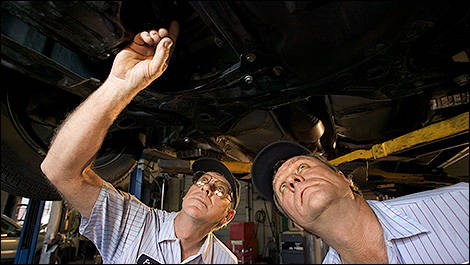Your vehicle, whether fairly new or well-used, has a way of communicating with you when it needs some attention. A light screech from the brakes, for instance, means your ride would appreciate a brake job. A loud squeal from under the hood typically means an accessory belt is in need of replacement. A drawn-out, struggling sound when starting the engine usually means the charging system or the starter itself should be looked at.
Then there are clunks.
These typically come from beneath the vehicle and can be experienced as bangs, pops or even clangs, depending on their cause.
If your ride exhibits any such sounds, possibly accompanied by a banging sensation felt through the floor, you're ride needs to visit a mechanic, pronto. Ignoring clunks can diminish ride comfort, affect steering and handling, and even cause an accident.
Here's a look at some common causes of concerning clunks, and what could happen if you ignore them. Not all possibilities are covered here, and sometimes worn-out suspension parts make no noise at all. The point is, if you've got any worries or if your ride is making any questionable sounds it needs a trip to your favourite service centre garage ASAP.
Sound:A grinding or popping noise -- possibly in succession.
When: While steering, almost always, and most notably when parked.
Possible Cause: Strut mounts. This component lets the front struts rotate in relation to the body of the car, allowing the wheels to steer. When strut mounts wear out, the bearings inside of them typically fail which makes it harder to steer the vehicle and puts additional strain on the steering system.
If Ignored: Steering effort will increase, meaning the driver will need to work harder to direct their car. Extra strain on the power-steering system will cause excessive wear of its components, too.
Sound:A light to moderate clunk or pop.
When: Over most or all bumps, especially sharp ones.
Possible Cause: Your shock absorbers could be wearing or worn. These components separate your vehicle's body from its wheels and have a major affect on ride quality, comfort, steering, and handling.
If Ignored: Blown shock absorbers will tend to make a vehicle ride like a lumber-wagon and diminish handling by bounding and bouncing excessively over bumps. Wheel contact with the road's surface is reduced, diminishing steering and brake-system effectiveness and increasing the likelihood of being in a collision.
Sound:A sharp popping, banging or clanging sound, sometimes accompanied by a banging sensation felt through the floor.
When: Over all or most sharp bumps, or even while cruising over uneven road surfaces.
Possible Cause: Ball joints. These important suspension parts are no bigger than golf balls, but when they wear out they make for a serious safety issue. Ball joints are comprised of two parts that are "pressed" together and serve a role in holding suspension and steering system components together. This is one suspension system component not to neglect.
If Ignored: In some cases, ball-joint failure can result in a wheel becoming severed from your vehicle's suspension, which will result in a total loss of control. Ever see a car on the side of the road with its nose on the ground and its front wheels pointing away from each other? That's ball-joint failure -- and it's no fun.
Sound: A rhythmic click or popping noise, possibly accompanied by a scrubbing or binding sensation at the back of your rear- or four-wheel drive vehicle.
When: Typically at lower speeds, while making sharper turns, like in a parking lot.
Possible Cause: The rear differential. Chattering, popping, clicking or scrubbing sensations usually indicate a problem, which could range from dirty, old differential fluid, water contamination of that fluid, worn-out internal parts or the need for a new differential all together.
If Ignored: Ignoring a rear differential noise can result in accelerated wear, reduced traction or even full differential failure in extreme cases. The latter will likely cause rear-wheel lock-up (causing a loss of control and accident) or failure to drive the rear wheels (resulting in you going nowhere, fast).
Then there are clunks.
These typically come from beneath the vehicle and can be experienced as bangs, pops or even clangs, depending on their cause.
If your ride exhibits any such sounds, possibly accompanied by a banging sensation felt through the floor, you're ride needs to visit a mechanic, pronto. Ignoring clunks can diminish ride comfort, affect steering and handling, and even cause an accident.
Here's a look at some common causes of concerning clunks, and what could happen if you ignore them. Not all possibilities are covered here, and sometimes worn-out suspension parts make no noise at all. The point is, if you've got any worries or if your ride is making any questionable sounds it needs a trip to your favourite service centre garage ASAP.
 |
Sound:A grinding or popping noise -- possibly in succession.
When: While steering, almost always, and most notably when parked.
Possible Cause: Strut mounts. This component lets the front struts rotate in relation to the body of the car, allowing the wheels to steer. When strut mounts wear out, the bearings inside of them typically fail which makes it harder to steer the vehicle and puts additional strain on the steering system.
If Ignored: Steering effort will increase, meaning the driver will need to work harder to direct their car. Extra strain on the power-steering system will cause excessive wear of its components, too.
Sound:A light to moderate clunk or pop.
When: Over most or all bumps, especially sharp ones.
Possible Cause: Your shock absorbers could be wearing or worn. These components separate your vehicle's body from its wheels and have a major affect on ride quality, comfort, steering, and handling.
If Ignored: Blown shock absorbers will tend to make a vehicle ride like a lumber-wagon and diminish handling by bounding and bouncing excessively over bumps. Wheel contact with the road's surface is reduced, diminishing steering and brake-system effectiveness and increasing the likelihood of being in a collision.
Sound:A sharp popping, banging or clanging sound, sometimes accompanied by a banging sensation felt through the floor.
When: Over all or most sharp bumps, or even while cruising over uneven road surfaces.
Possible Cause: Ball joints. These important suspension parts are no bigger than golf balls, but when they wear out they make for a serious safety issue. Ball joints are comprised of two parts that are "pressed" together and serve a role in holding suspension and steering system components together. This is one suspension system component not to neglect.
If Ignored: In some cases, ball-joint failure can result in a wheel becoming severed from your vehicle's suspension, which will result in a total loss of control. Ever see a car on the side of the road with its nose on the ground and its front wheels pointing away from each other? That's ball-joint failure -- and it's no fun.
Sound: A rhythmic click or popping noise, possibly accompanied by a scrubbing or binding sensation at the back of your rear- or four-wheel drive vehicle.
When: Typically at lower speeds, while making sharper turns, like in a parking lot.
Possible Cause: The rear differential. Chattering, popping, clicking or scrubbing sensations usually indicate a problem, which could range from dirty, old differential fluid, water contamination of that fluid, worn-out internal parts or the need for a new differential all together.
If Ignored: Ignoring a rear differential noise can result in accelerated wear, reduced traction or even full differential failure in extreme cases. The latter will likely cause rear-wheel lock-up (causing a loss of control and accident) or failure to drive the rear wheels (resulting in you going nowhere, fast).
Read more on the subject
|




